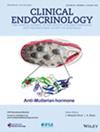Klinefelter Syndrome: A Review
Abstract
Background
Klinefelter syndrome (KS) is an uncommonly recognised condition typified by gynaecomastia, small testes and aspermatogenesis. It is caused by a supernumerary X chromosome, resulting in a 47 XXY karyotype. Since its first description, the phenotype of KS has evolved and there is a much greater appreciation of the subtle features of the condition.
Method
In this review, we explore the phenotype of the KS with particular consideration to patients with pre-natal and early infancy diagnosis, given that this is becoming increasingly common. The current understanding of the genetic mechanisms of KS, caused by supernumerary X chromosome are explored and the genotype-phenotype correlation are discussed.
Results
The implications of the condition both in childhood and later development are explored in detail, with particular focus on social and educational implications. Potential treatments, with emphasis on preservation of fertility are discussed. We highlight the optimal therapeutic conditions in which fertility preservation is most likely to be achieved, compared to those which can be more challenging. Finally, we discuss the other health challenges which can be associated with KS. These include poor bone health, diabetes, cardiovascular complications, and malignancy. The challenges in managing these co-morbid conditions and most up-to-date management recommendations are also explored.

 求助内容:
求助内容: 应助结果提醒方式:
应助结果提醒方式:


